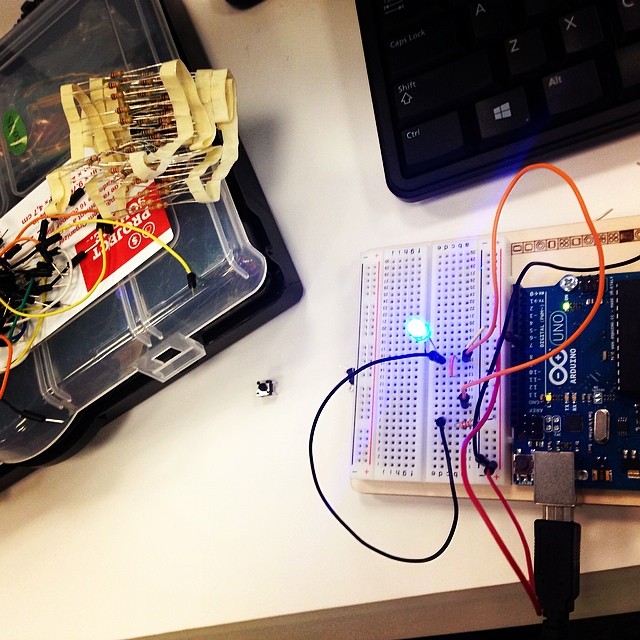COUNTERPOINT
On the flipside, are Capps' thoughts which we've printed in their entirety below.
"Over the past two years, I have been a high school English teacher for the Denton Independent School District, have taught both on-level and advanced courses, and have been respected enough by my peers to hold leadership roles in my department. Despite the opportunities I have been given here and the respect I have for the position of my district’s leadership, I feel obligated to publicly dissent with the change in grading policy due to be implemented next year in our district. Since the district published their grading policy before fully informing its faculty and staff of its implications or mechanics, my dissent will also be in the public forum where it may actually be heard.
My hope is that the district does intend for these new grading policies to improve student learning. Throughout the early meetings we had regarding suggested grading proposals, the idea of best practices was continually repeated, stressing the importance of giving our students the confidence to practice learning without fear of failure and attempting to replicate life’s tendency to offer multiple chances to correct and learn from our mistakes without consequence. These are beautiful, utopian goals that are excellent in theory, but upon closer examination fall short of engaging realistic problems. Aspects of the grading policy are even workable in classrooms—retesting after a period of reeducation, authentic assessment of student learning based solely on their academic understanding, deemphasizing grading of practice work so students feel confident that initial misunderstanding of material is forgivable—yet before this policy, the administration of these tasks were under a teacher’s professional purview and already in place in many classrooms. Their removal under the provisions of the new grading policy will only increase the distrust of an already harangued and beleaguered profession rapidly losing its sense of professional autonomy. For a teacher who is dedicated to the successful education of their students, an atmosphere of encouragement is already paramount and such an educator needs no reminder from an administrator, parent, or gradebook that such values should exist. If our professional judgment is so shallow and baseless, then surely the solution is to hire more qualified and trustworthy people rather than micromanaging people who are apparently viewed as incompetent by their leadership.
Most importantly, however, is actual best practice for teaching the future generation of American citizens, professionals, and leaders. As any sentient adult can tell you, almost every aspect of functional public and private sectors is based on some type of ranking or merit system. Success in careers, promotions, relationships, and finances is built on a combination of passion and ambition, both of which will be squelched in teaching staff and students should the policy be implemented without revision across the district. Primarily this applies to on-level students, since advanced classes tend to be filled with students backed by parents who care about education for its own purpose or the ends to which it is the means. These students are generally intrinsically motivated and will learn regardless of what system they are placed in. However, there are significant issues with using this grading system in advanced classrooms because the TEKS standards on which the new system is built do not apply to these classes, but the constricted grading scale, in which the teacher has very limited say, does apply to these courses.
On the opposite side of the fence are my on-level students, who deserve as much a voice as their advanced counterparts. These students are practical, filled with personality and humor, and certainly have something to contribute, but these students are the most in need of advocates who refuse to let them bring less than their best efforts to the classroom and life as a whole. They need teachers and staff to believe that they can and will be people who fill meaningful and beautiful places in the world. What little motivation these kids have—outside from their families—is often the daily interaction with their teachers who are committed to pushing them to be their best selves. High school is temporary (thank God), and we should be constantly reminding on-level students that this is preparation for independent lives achieving personal goals. Because this system is divorced from reality, and it certainly feels like a bad marriage when you’re in the middle of it, these students are being done an egregious disservice. Rather than driving students to maintain high standards for themselves, we’ve told them deadlines are amorphous, debatable trivialities. Rather telling them that their best effort, even if this results in a C average, is admirable and to focus on building skills for their own sake, we’ve created a culture that shames, mythologizes, and renames failure in a supremely flawed, if well-meaning, attempt at egalitarianism. This false sense of equality has permitted ridiculous acts of showmanship such as awarding eight students with the status of Valedictorian at one high school in our district alone, and created the adverse effect of telling our average student their contributions are not valued. There is incredible dignity and worth in being yourself, and celebrating achievement as it pertains to that student, as long as they are working to learn and perform at the best of their personal ability. A true reflection of the effectiveness of the new policy will be the amount of failures; if failure rates rise before they fall, then the system may have some measure of accuracy, but if they drop seriously and immediately, this will be a clear example of educational veneer for the sake of placating statistics. If we see that these students feel defeated, unmotivated, or unengaged by school, which many are, then change is certainly called for—but not arbitrary change created by administrators who have been out of a teaching position for years or out of school buildings altogether.
There are many solutions to this problem. Allow disinterested students to test out of school earlier and enter trade schools as is done in the United Kingdom. Increase education budgets so class sizes can shrink and teaching staff expand so that more individual attention can be given to each student. As adults, refuse to decrease rigor in education just because teenage students are naturally adverse to challenges, and find ways to engage a new generation on their own terms. Adapt without sacrificing integrity. This grading policy is a short-term solution that will have a long-term effect of increased apathy in both teachers and students. Though the district has claimed that this was written and supported by teachers, this is not actually the case, and I have personally seen and experienced the overwhelming negative impact of students realizing due dates are debatable as their work is put on the back burner and curriculum quality slides in an attempt to accommodate these delays. I can’t speak for all schools in the district, but the shift in morale from eagerness to dismay to survivalism has been palpable and created a place where no professional wants to work and subsequently, a place where no student wants to learn.
At the age of twenty-three, I can’t resist adding a personal note of indignation here at the end since I am technically a member of the generation currently being educated. Though this generation is more tech-savvy, tolerant, and, at times, more intransigent than some that have gone before it, that shouldn’t indicate a lack of understanding, ability, or value. Instead of continuing to placate the gleeful mediocre who insist on celebrating equality for its own sake instead of preferring dignity, we ought to cultivate a generation who cares deeply for the world and the knowledge in it. My generation desires to be challenged as active participants in the creation of the world we want to see, and lowering the bar of your expectations is insulting, demeaning, and unneeded. Our culture as a whole has begun to criticize and decry our public school system because of measures like these, which push our curriculum and standards lower so that the appearance of fairness can be achieved. When our policy makers, administrators, and district officials refuse to listen well to professional and knowledgeable educators, receive constructive criticism, or work for what is wiser rather than easier, our education system has no hope of improvement. Despite the presence of some phenomenal and talented staff, I would not put my student into DISD for the upcoming year, and I am deeply concerned for my colleagues who will carry the consequences and blame for a executing a policy they are not responsible for in a district where their voices are not heard."








































































































































































